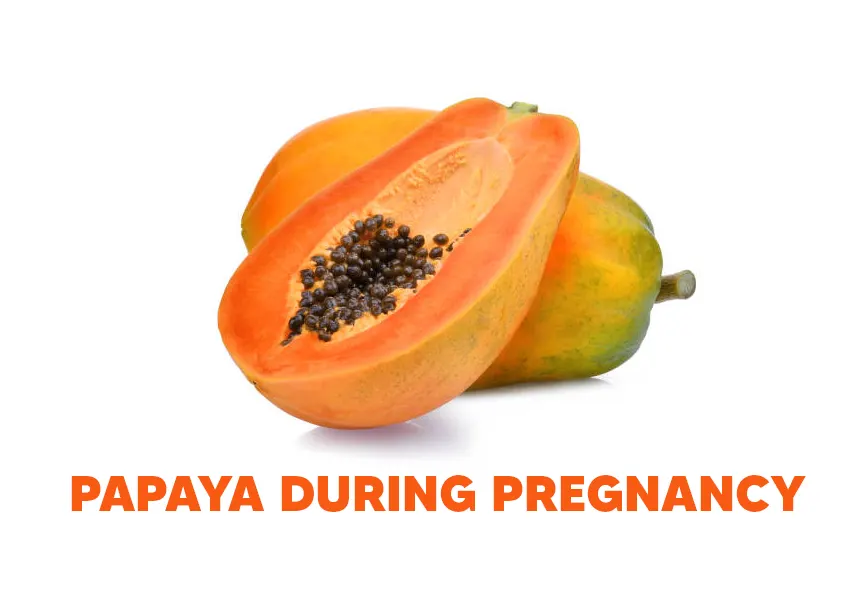Papaya During Pregnancy: Safe or Unsafe?
Let us explore the details of papaya during pregnancy and answer the frequently asked questions.
Having a baby is an exciting time in
the life of a woman, but it can also be a time when she has many questions. One
of these questions is whether certain foods are safe to eat, including papaya.
With its bright color and sweet flavor, papaya is a tropical delicacy. However,
it raises eyebrows for pregnant women with several myths and concerns. So let
us explore the details of papaya during pregnancy and answer the frequently
asked questions.
Papaya Nutritional Value
Papaya is rich in vitamins and
minerals such as vitamin C, vitamin A, potassium, and folate. It has a high
fiber content so it promotes digestive health, and the natural enzymes such as
papain inside it can help with stomach problems. But when it comes to
pregnancy, not all papaya is equal. The stage of ripeness is an important
factor in its safety.
Can I Eat Papaya During Pregnancy?
The short answer: It depends.
Papaya fruit: Ripe Fresh papaya is generally considered safe and can be a healthy part of a pregnant woman's diet. It helps with hydration, aids in digestion, and contains nutrients essential for the growing baby.
Papayas: Conversely, raw or
semi-ripe papaya has latex in it which is said to cause uterine contractions.
This is the reason why consuming unripe papaya during pregnancy is generally
recommended.
Papaya for Pregnant Women: Is It Safe?
Moderate consumption of ripened
papaya can be useful for pregnant women. It has antioxidants that help
strengthen immunity, folate that aids fetal development, and potassium that
helps control blood pressure levels. It also alleviates morning sickness and
constipation, which are common with pregnancy.
Unripe Papaya and Pregnancy Risks
Raw papaya is a different situation
entirely. Its latex element includes prostaglandins and oxytocin-like
substances that can activate the uterus and possibly induce preterm work and
even a miscarriage. This is particularly frightening in the early days of
pregnancy.
Can Papaya Cause Miscarriage in Early Pregnancy
So while ripe papaya is safe, eating
unripe papaya in early pregnancy can put you at risk. However, the latex in
immature papaya can cause uterine contractions that will increase the risk of
miscarriage. If you're in your first trimester, it's best to avoid consuming
unripe or semi-ripe papaya entirely.
The Benefits of Eating Papaya for Pregnant Women
Yes, but only if it is very ripe. Some of the many benefits of ripe papaya include:
Digestive Aid: Relief from bloating and indigestion.
Immune Stimulator: High content of vitamin C and thus strengthens your immune system.
High in Folate: Helps form the neural tube in the fetus.
Hydration: Its water contents, 93 percent, keep you hydrated.
That said, even ripe papaya should
be eaten in moderation. In some cases, over-eating says upset stomachs or
allergies.
Is It Safe to Eat Raw Papaya During Pregnancy?
Is papaya safe during pregnancy or
not: papaya raw / unripe (Yes or No) Although papaya is known for its
nutritional properties, the health risks of consuming raw or unripe papaya
during pregnancy are greater than its potential benefits. Here’s more on why
raw papaya should be avoided:
1. Risks of Latex in Raw Papaya
Green papayas contain a high amount of latex, which can be harmful during pregnancy.
Uterine Contractions: Latex is interestingly composed of enzymes, including papain and pepsin, which may trigger uterine contractions. This increases the risk of preterm labor or even miscarriage, particularly in early pregnancy.
Hormonal Disruption: Papain acts
similarly to prostaglandins (hormones that can cause labor) Interfering with
this stomach hormone is especially dangerous when someone is pregnant.
2. Potential Effects on the Fetus
Toxicity Risk: The compounds in
latex can interfere with fetal development, especially during the first
trimester.
Placental Issues: Excessive uterine
contractions caused by raw papaya may impair blood flow to the placenta,
potentially harming the baby.
3. Digestive Complications
Raw papaya contains latex, which can irritate the stomach lining and worsen digestive issues commonly experienced during pregnancy.
Nausea and Bloating: Raw papaya may worsen the symptoms of bloating, nausea, or heartburn.
Risk of Allergic Reactions: Pregnant women may also be highly susceptible to allergens, and raw papaya can cause allergies ranging from mild itching or rashes to serious throat constriction and difficulty breathing.
Why Papaya is Avoided During Pregnancy Completely
Raw papaya also contains latex, and
even small amounts of raw papaya can be dangerous. Avoid raw papaya, in salads
and smoothies, as well as cooked dishes, Shetty advises.
If you’re looking for a more
targeted ethnographic approach, always inquire about dishes, especially if raw
papaya might be involved, as might be the case with certain Asian or tropical
recipes.
How to Include Ripe Papaya in Your Pregnancy Diet
If you are certain the papaya has fully ripened, here’s how to safely eat it:
Smoothies: Combine ripe papaya with yogurt and other fruits for a refreshing beverage.
Salads: Cut ripe papaya and combine it with other fruits for a healthy fruit salad.
Snacks: Eat it plain as a quick and healthy snack.
Papaya during pregnancy: Myths vs Facts
There are many myths associated with papaya and pregnancy. Let’s sort fact from fiction:
MYTH: Any papaya eaten in pregnancy could lead to miscarriage.
FACT: Only green papaya is
dangerous because of its latex. You can eat ripe papaya and it’s perfectly safe
and nutritious.
MYTH: Papaya can cause damage to the development of the baby.
FACT: Papaya is full of vitamins
that help in the growth of the baby.
MYTH: Papaya should be avoided at all stages of pregnancy.
FACT: Women can eat ripe papaya in
moderation during pregnancy.
What are the alternatives to Papaya for pregnant women?
If you are still confused whether you can consume papaya or not, here are some safe and nutritious fruits you can eat during pregnancy:
Bananas: Great for reducing nausea and providing energy.
Oranges: Packed with vitamin C for immunity.
Apples: Contains a lot of soluble fiber, helps digestion.
Berries: High in antioxidants and vitamins.
To Know When Eating Papaya During Pregnancy
To ensure safety, follow these tips:
1. Check Ripeness
Only consume fully ripe papaya. A fully ripe papaya is orange or yellow inside, yields to pressure, and will smell sweet.
Unripe or semi-ripe papayas have latex, a milky fluid that can trigger contractions in the uterus and may induce premature labor or miscarriage.
Always check the fruit for ripeness.
When in doubt, just don’t eat it at all.
2. Moderation is Key
Even ripe papayas need to be eaten in moderation. Overeating can cause digestive issues like bloating, diarrhea, or stomach cramps.
Limit papaya consumption to small
portions, such as two or three slices, and avoid eating it daily during
pregnancy.
Fill out your diet with other fruits
and nutrients, to make sure you’re getting a broad array of essential vitamins
and minerals.
3. Consult Your Doctor
If you're unsure whether papaya is safe, consult your doctor or nutritionist.
Pregnancies that are complicated, such as with a history of preterm labor or a sensitive stomach, may need stricter dietary restrictions.
Consult a specialist for the role of
papaya in your pregnancy diet.
4. Avoid Unripe or Semi-Ripe Papayas
Unripe papayas have latex, which contains papain and pepsin, that you may want to steer clear of as it can disrupt fetal growth and hormonal balance.
These compounds can act like
prostaglandins, which induce premature labor and uterine contractions.
5. Monitor Allergic Reactions
It is very rare, but some people are allergic to papaya. Symptoms can involve itching, swelling, or trouble breathing.
Stop eating papaya and seek medical
advice immediately if you experience unusual symptoms.
6. Hygiene and Preparation
Always wash papaya well before peeling and cutting. This eliminates any pesticides, dirt, or bacteria found on the skin.
Store papayas in a clean, dry place
and avoid eating overripe or spoiled fruit, as it may contain harmful
organisms.
Conclusion
Papaya is one fruit that can be friendly and an enemy of pregnancy. Papaya has many health benefits, but unripe papaya is a high risk, especially in the early stages of pregnancy. It is vital to understand the difference between the two for making informed dietary decisions.
Whenever in doubt, play it safe -
either avoid papaya or consult your health care provider. Please, pregnancy is
all about putting you and your baby’s health first.
FAQs
1. Is it safe to eat papaya in pregnancy if ripe?
Yes - ripe papaya is safe and
nutritious for pregnant women when they eat in moderate amounts.
2. Why is papaya (unripe) unsafe in pregnancy?
Unripe papaya contains latex, which
may induce contractions of the uterus, leading to problems such as
miscarriage or premature labor.
3. What are the benefits of ripe papaya during pregnancy?
Ripe papaya aids digestion, enhances
immunity, and supplies folate and vitamin C.
4. Is Papaya can cause miscarriage In early pregnancy?
Papaya: Papaya increases the chances
of miscarriage if consumed as it contains latex that may cause uterine
contractions.
5. Is unripe papaya good for pregnancy?
No, pregnant women should avoid raw
or unripe papaya throughout their pregnancy.


